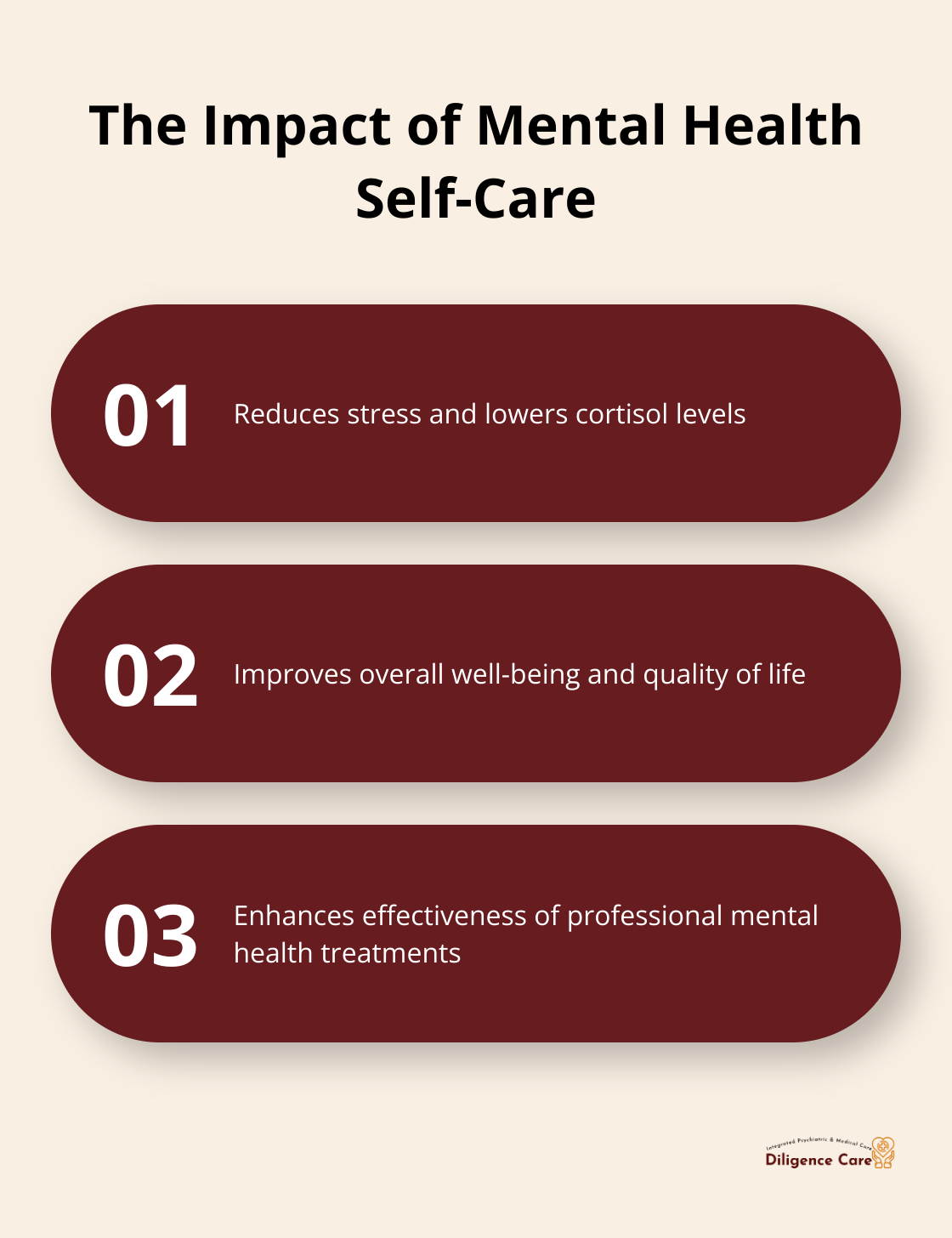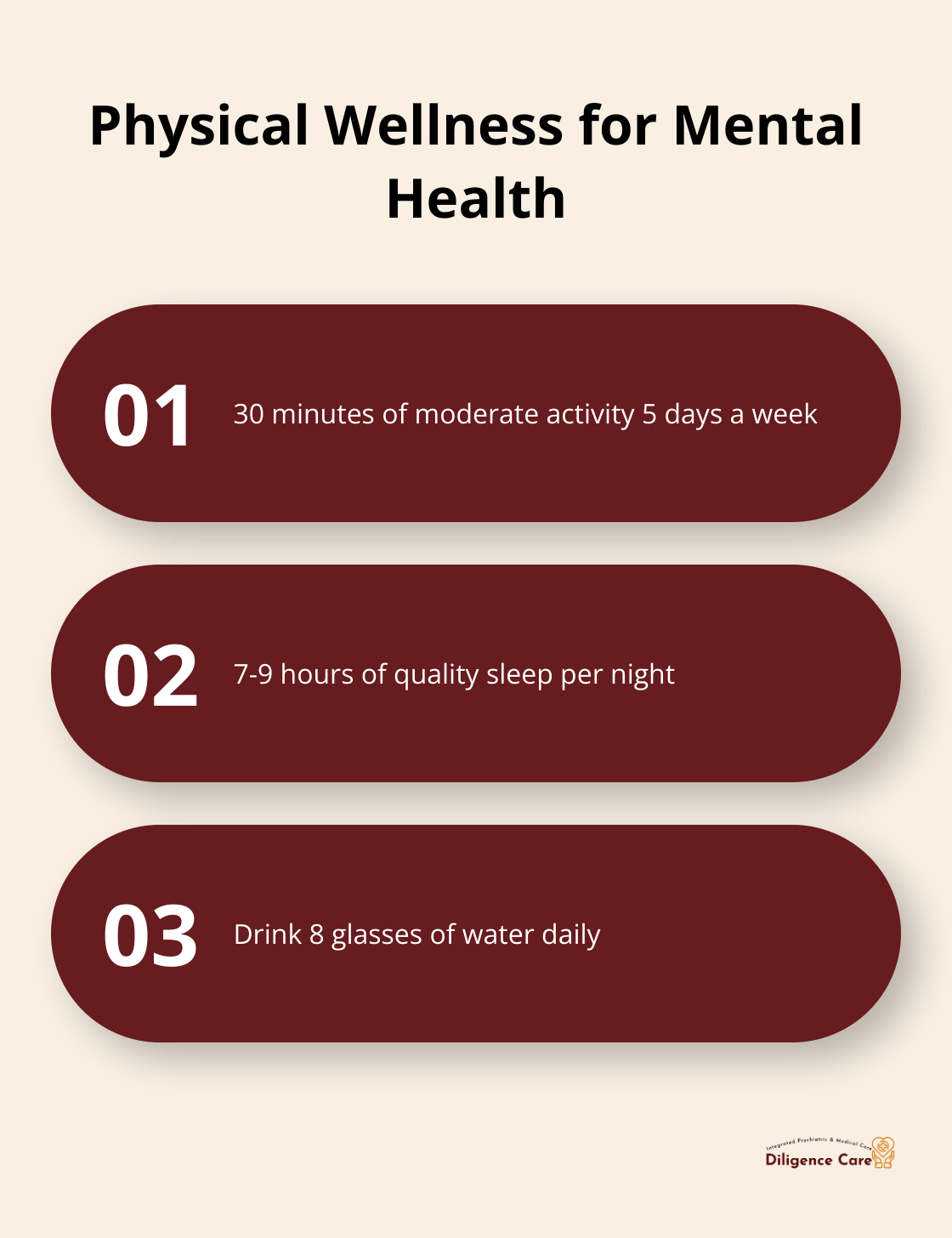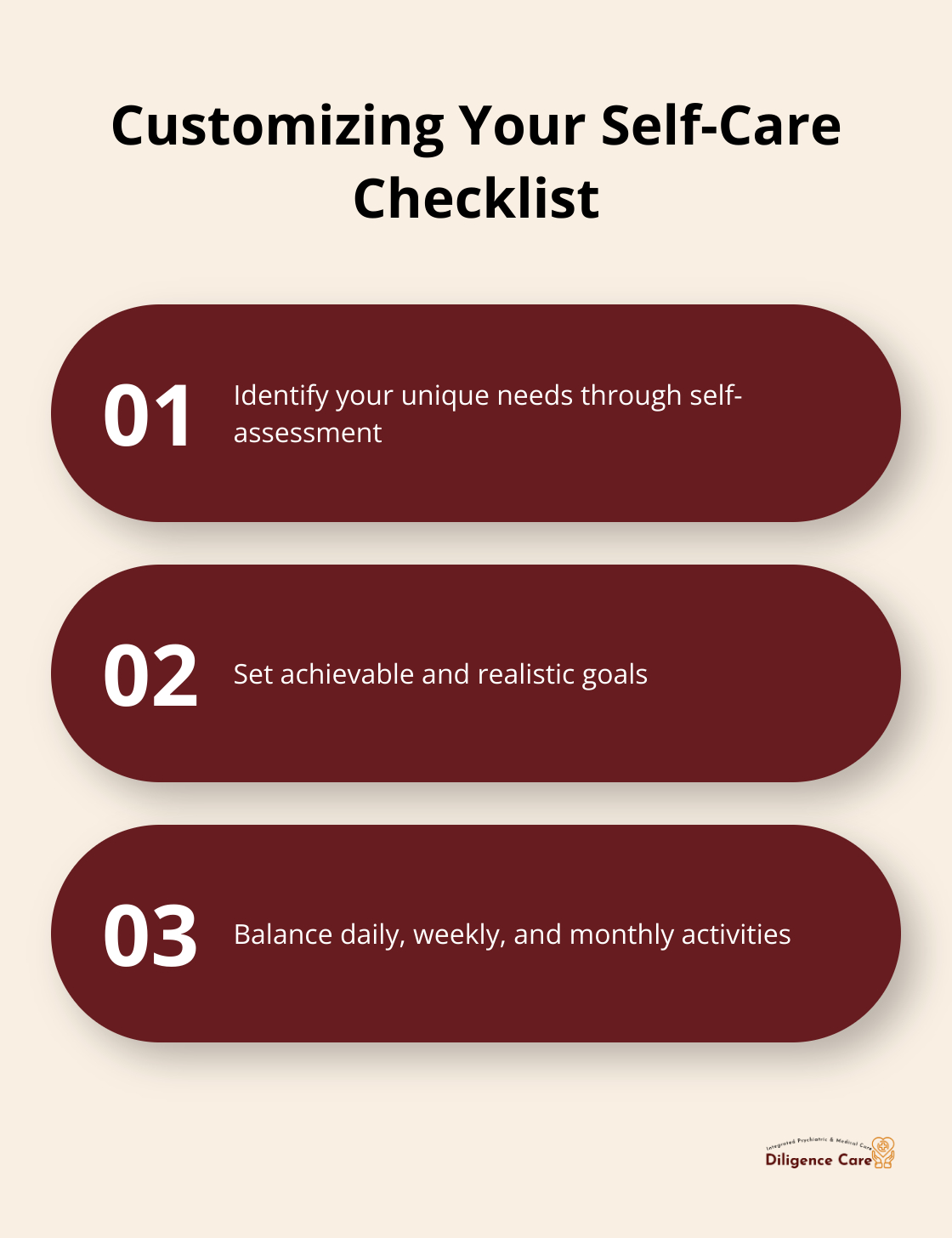
How to Create a Mental Health Self-Care Checklist
At Diligence Integrated Care, we understand the vital role of self-care in maintaining good mental health. A mental health self-care checklist can be a powerful tool to help you prioritize your well-being.
Creating a personalized checklist allows you to focus on activities that nurture your mind, body, and spirit. In this post, we’ll guide you through the process of developing an effective mental health self-care routine tailored to your unique needs.
Why Mental Health Self-Care Matters
Defining Mental Health Self-Care
Mental health self-care consists of intentional actions you take to protect and improve your psychological well-being. It involves treating yourself with the same kindness and attention you’d give to a loved one. Self-care isn’t a luxury; it’s a necessity for maintaining good mental health.
The Power of Self-Care Routines
A consistent self-care routine can transform lives. The Stress in America™ survey measures attitudes and perceptions of stress among the general public and identifies leading sources of stress and common behaviors. This correlation makes sense when you consider how self-care activities (such as exercise, meditation, or even a relaxing bath) can lower cortisol levels and boost mood-enhancing neurotransmitters.
Self-Care as a Pillar of Well-being
Self-care isn’t separate from your overall health-it’s a fundamental part of it. The World Health Organization defines health as “a state of complete physical, mental and social well-being,” not just the absence of disease. When you prioritize self-care, you actively contribute to your holistic health. This approach doesn’t just prevent burnout or manage stress; it builds resilience and enhances your capacity to enjoy life fully.

Enhancing Treatment Effectiveness
For those undergoing treatment for mental health conditions, self-care can powerfully complement professional care. A recent study published in the Pan African Medical Journal examined the effectiveness of health care finance in promoting health. For instance, regular exercise can boost the impact of antidepressants, while mindfulness practices can reinforce cognitive behavioral therapy techniques.
Integrating Self-Care into Daily Life
Self-care doesn’t replace professional help, but it forms an essential part of a comprehensive approach to mental health. When you integrate self-care into your daily life, you don’t just support your current treatment-you invest in your long-term mental health and overall well-being.
As we move forward, let’s explore the key components that make up an effective mental health self-care checklist. These elements will help you create a personalized routine that addresses your unique needs and supports your journey towards improved mental health.
Building Your Mental Health Self-Care Arsenal
Physical Wellness: The Foundation of Mental Health
Your body and mind are interconnected. Regular exercise releases endorphins, nature’s mood boosters. Try 30 minutes of moderate activity five days a week (this could be a brisk walk, yoga, or dancing to your favorite tunes). Sleep is not a luxury, it’s a necessity. Most adults need 7-9 hours of quality sleep per night. Create a bedtime routine that signals to your body it’s time to wind down.
Nutrition plays a significant role too. A balanced diet rich in omega-3 fatty acids, found in fish and walnuts, can help combat depression. Hydration is often overlooked, but it’s vital for cognitive function. Keep a water bottle handy and try to drink 8 glasses a day.

Emotional Intelligence: Nurturing Your Inner World
Emotional intelligence can lead to improved communication skills, reduced anxiety, and fortified mental well-being. Start a journal to track your emotions. This practice can help you identify patterns and triggers. Dr. Bolanle Oluwadara, MD at Diligence Integrated Care often recommends mindfulness exercises to her patients. Try the 5-4-3-2-1 grounding technique: name 5 things you can see, 4 you can touch, 3 you can hear, 2 you can smell, and 1 you can taste. This simple yet powerful exercise uses your senses to anchor you in the present moment, helping you find some calm amidst the chaos.
Don’t underestimate the power of a good laugh. Watch a comedy show or call that friend who always cracks you up. Laughter reduces stress hormones and increases feel-good endorphins.
Social Connections: Your Support Network
Humans are social creatures. Regular social interaction is essential for mental health. Schedule weekly catch-ups with friends or family. If you feel isolated, consider joining a club or volunteering. These activities not only provide social interaction but also give a sense of purpose.
It’s quality over quantity. One meaningful conversation can be more beneficial than hours of small talk. If you struggle to maintain social connections, our team at Diligence Integrated Care can provide strategies to help you build and nurture relationships.
Professional Growth: Balancing Work and Well-being
Your work life significantly impacts your mental health. Set clear boundaries between work and personal time. If you work from home, create a dedicated workspace that you can ‘leave’ at the end of the day.
Continuous learning can boost self-esteem and provide a sense of accomplishment. Set aside time each week for professional development (this could be reading industry news, taking an online course, or attending a webinar).
If work stress overwhelms you, don’t hesitate to reach out to our mental health professionals at Diligence Integrated Care. We can help you develop coping strategies and explore potential career adjustments if necessary.
Environmental Wellness: Creating Your Sanctuary
Your environment plays a significant role in your mental state. Declutter your living space – a tidy environment can lead to a tidy mind. Bring nature indoors with houseplants or a small herb garden. Studies show that indoor plants can reduce stress levels and increase productivity.
Consider the impact of noise on your mental health. If you live in a noisy area, invest in noise-canceling headphones or a white noise machine. Create a cozy corner in your home dedicated to relaxation and self-care activities.
Self-care isn’t selfish – it’s essential. These components form the foundation of a comprehensive mental health self-care checklist. In the next section, we’ll explore how to customize this checklist to fit your unique needs and lifestyle.
How to Tailor Your Self-Care Checklist
Identify Your Unique Needs
Start with a self-assessment. What areas of your life need more attention? Do you struggle with sleep, feel isolated, or experience work-related stress? Keep a mood journal for a week. Note your energy levels, emotions, and any physical symptoms. This data will help you pinpoint areas that need focus in your self-care routine.
Incorporate Professional Recommendations
Mental health professionals often suggest specific activities based on individual needs. For instance, a provider might recommend 10 minutes of daily meditation for anxiety management. Another could suggest a 30-minute walk three times a week for mood improvement. Include these targeted recommendations in your checklist for maximum benefit.
Set Achievable Goals
When you create your checklist, be realistic. Start small and build up. Instead of aiming for an hour of exercise daily, begin with 15 minutes three times a week. The importance of setting attainable goals cannot be overstated. It helps avoid feeling overwhelmed. Consistency trumps intensity when it comes to self-care.
Balance Your Checklist
A well-rounded self-care routine addresses various aspects of your life. Include daily tasks (like a 5-minute morning gratitude practice), weekly activities (such as a Sunday meal prep session), and monthly goals (like scheduling a therapy session). This balanced approach ensures you nurture all aspects of your mental health regularly.

Seek Professional Feedback
Your mental health provider can offer valuable insights into your self-care plan. They can help you refine your checklist based on your progress and changing needs. A provider might suggest adjusting your sleep routine if insomnia persists, while another could recommend adding stress-reduction techniques if work pressures increase.
Your self-care checklist should evolve as you do. Regular check-ins with yourself and your mental health provider will ensure your checklist remains an effective tool in your mental health journey.
Final Thoughts
A mental health self-care checklist empowers you to take control of your well-being. You should start small and gradually build your routine to prevent overwhelm and increase long-term success. Time constraints, guilt, or difficulty prioritizing yourself can hinder self-care efforts, but scheduling these activities like important appointments can help overcome these obstacles.
Your checklist must evolve as your needs change. Set aside time every few months to reassess and adjust your practices to ensure they remain relevant and beneficial. This proactive approach, combined with professional support when needed, can lead to significant improvements in your mental health and overall quality of life.
We at Diligence Integrated Care stand ready to support you in your mental health journey. Our team can provide guidance, help refine your self-care strategies, and offer additional support (including assistance with creating a mental health self-care checklist). Your path to better mental health begins with consistent, small steps, and we’re here to help you along the way.











